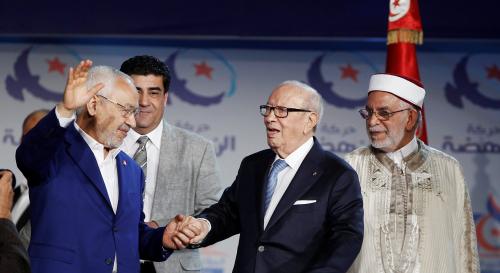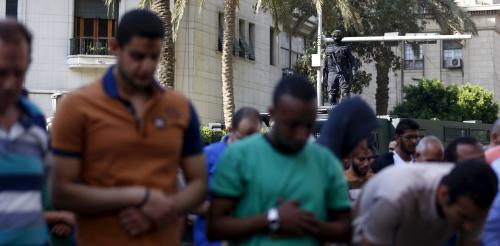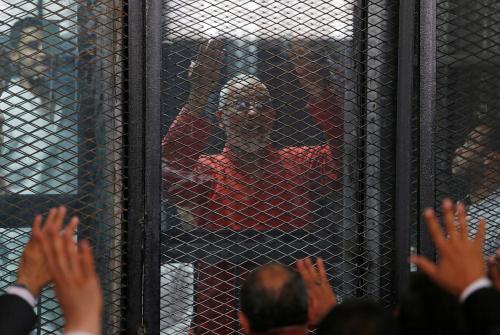We recently put a set of questions to ten expert contributors participating in our Rethinking Political Islam initiative. (See here for the list of scholars.) Participants include leading scholars of Islamist movements, with each having conducted extensive fieldwork on Muslim Brotherhood and Brotherhood-inspired groups in 12 countries.
The first question we posed to our experts was: How likely is it that the Muslim Brotherhood will abandon its official non-violent stance? The second was: How likely is it that an Islamist group will govern in each Arab country by 2020? The third was: How likely is a significant split within the Egyptian Muslim Brotherhood by 2020?
Our fourth question—and the subject of this post is—by 2020, will more or fewer Islamist groups participate in elections in the Middle East compared to today? Participants were asked to answer on a 5-point scale, with a 1 meaning significantly more groups would participate in elections and a 5 meaning that significantly fewer groups would participate. Overall, our experts arrived at an average of 2.7, meaning they expect the number of Islamist groups engaging in electoral politics to remain more or less stay the same by 2020.
We gleaned a number of key takeaways from respondent comments.
There may be a proliferation of Islamist parties in countries still holding elections, even if the number of those countries has dwindled. As one expert put it, there still remains a “large constituency for the ‘Islamist vote’ and entrepreneurs will form new parties to compete for this vote without the Brotherhood’s baggage…it will be in regimes’ interest to encourage this fragmentation of the Islamist vote into smaller parties.” Along similar lines, one scholar surveyed expects “there to be fewer elections held in 2020 than today, but more Islamist groups participating in those countries still holding elections.”
Some of these projections, however, depend on the extremely fluid politics of countries experiencing civil conflict. One scholar noted, for example, that “the conclusion of several regional wars combined with a growing backlash over ongoing governance deficits will tempt more Islamists into the electoral process.”
Regardless of whether Islamist groups multiply or diminish in response to state repression and ongoing civil wars, a (growing) minority of Islamists, particularly among younger members, find themselves jaded about the very idea of elections. With the exception of Tunisia (and to varying degrees Iraq and Lebanon), doing well in elections, or even having significant representation in parliament, does not—and generally has not—translated into broader societal change. Even in less repressive but still authoritarian countries like Morocco and Jordan, monarchies remain the dominant political actors with veto power over major decisions.
Morocco is one of the few Muslim-majority countries that has had a democratically-elected Islamist prime minister, but even there first Abdelilah Benkirane of the Justice and Development Party (PJD) and now Saadeddine Othmani have been significantly circumscribed in what they can actually do. This can have the effect of further diminishing faith in the electoral process as an effective means for political and social change.
Does the Tunisian “exception” matter? One respondent felt that the example of successful Islamist parties, namely Ennahda, may serve to spur greater electoral participation, but in a softer, more precarious form:
[Ennahda’s] success in gaining credibility with suspicious old regime elites and [its] ability to keep its base on board through highly pragmatic compromises could—if it lasts—decrease fear of Islamist parties from populations elsewhere in the Arab world. It could demonstrate that Islamist parties can be trusted in power, buoy capacity and transnational lesson-learning to other Arab Islamist parties.
Such a self-limiting approach raises questions, however. If this is what it takes an Islamist party to survive post Arab Spring, then what prospects do more avowedly “Islamist” Islamist parties have? This may also contribute to the perception, noted in the previous section, that Islamist electoral success, even in relatively democratic contexts, is “winning” without winning.
Instability and uncertainty can create Islamist opportunity. One expert who was surveyed counseled observers to closely monitor how Islamists adjust when (or if) political space opens up across the region, especially in the Gulf, as “the economic changes that are coming in the GCC states will be destabilizing and may lead to a greater opening of representative institutions in [some of] these countries.”
Islamists operating in conditions of major instability is another area to keep tabs on, wrote one respondent—especially in Yemen:
I find it more likely that there would be something we could broadly recognize as governing by Islamists in countries where there has been broad collapse in order. Islamists have done (at least somewhat) well under conditions of state collapse: Syria, Libya, and Yemen.
In Yemen, Islamists are well-integrated in the government and have been for years, though this government is contested, [has limited territorial control], and enjoys little legitimacy. It seems virtually certain though that whatever the outcome of the war in Yemen, Islamists (whether the Brotherhood-inspired Islah party or Houthis, or both) will play a formal role in whatever new government develops.








Commentary
By 2020, will more or fewer Islamist groups participate in elections in the Middle East compared to today?
January 4, 2018